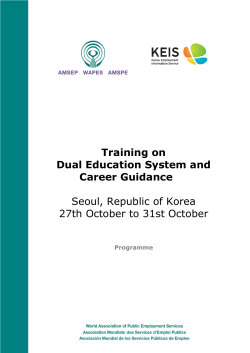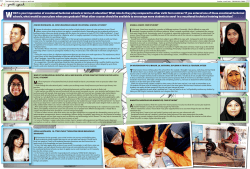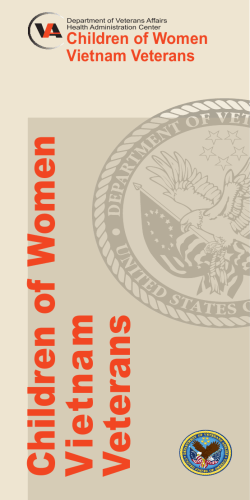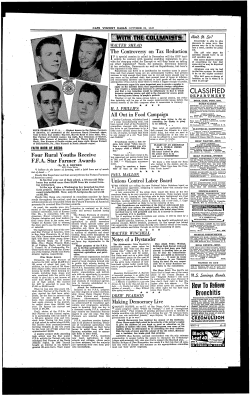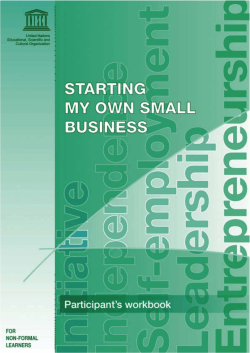
How to teach vocational education: A theory of vocational pedagogy
How to teach vocational education: A theory of vocational pedagogy Bill Lucas, Ellen Spencer and Guy Claxton with Charlynne Pullen and Kathleen Collett November 2012 “There is currently a lack of widely accepted vocational pedagogy partly because the sector is constantly changing, so the ground rules for vocational education change. There is a misunderstanding about who vocational education is for. Is it for students or is it for employers? The regime is trying to do too many things. Is my catering course letting me know what my skill levels are to improve and move on to the next level, or is it access to Higher Education?” Sally Dicketts, Principal of Oxford and Cherwell Valley College. “It seems to me that the really good practical person engaged with their craft intelligently would be rather appalled by shoddy work, not because it might mean less money or less bonus, but because it offends them to see something done shoddily.” Professor Richard Pring, Lead Director of the Nuffield Review of 14-19 Education and Training. “For me, the big driver in vocational education is that it involves real-time, real-world activities, with an opportunity to have a coach or guide available to review feedback, reflect with the person, or even to be that guiding hand through the process.” Andy Smyth, Accredited Programmes Development Manager, TUI Travel UK and Ireland. This research project, commissioned by the City & Guilds Centre for Skills Development, offers a theoretical underpinning for a vocational pedagogy. Our theory sets out the different types of vocational education, the outcomes of vocational education, and effective ways of teaching vocational education. The report highlights the need for a theory of vocational pedagogy, to provide a clear framework for understanding and appreciating vocational education. PHYSICAL MATERIALS In order to assist thinking about vocational pedagogy, our research identifies the three types of vocational education, with the caveat that each course or programme is likely to be a mix of all three. They are shown in the diagram alongside, and together enable thinking about vocational pedagogy that is tailored towards one or more of these types. Sport science Plumbing Construction management Civil engineering Hairdressing Creative arts and graphic design Performing arts Aromatherapy Childcare Electrical installation Information technology Computer games development Counselling Marketing PEOPLE 2 How to teach vocational education: A theory of vocational pedagogy Journalism Accountancy SYMBOLS Outcomes of vocational education Routine expertise In considering the outcomes of vocational education, the research identifies six clear outcomes that fulfil the overall goal of developing working competence. The six outcomes, as described through the example of a plumber, are: Common gas boiler requires annual service. 1 Resourcefulness Gas boiler is cutting out within minutes of igniting, and requires repair. Functional literacies Client shows interest, questioning progress of repair and likely cause and solution. Plumber is required to summarise actions on work log for client and office. 3 Business-like attitudes Client is experiencing repeated problem. 5 Plumber adjusts his use of technical language to accommodate the experience and apparent comprehension of the client. Plumber summarises the problem and actions taken in a way that will make sense to the client, administrative colleagues and boss. Plumber recognises that client has called him out for this problem before. He returns at short notice for a free-of-charge assessment to minimise potential for complaint, and to ensure ongoing relationship with client. Wider skills The problem with the boiler is initially tricky to solve. 6 3 2 Craftsmanship Plumber has experience with this make and model of boiler, and understands the range of potential problems and how to fix them. Having tried the most obvious solution, which has not resolved the fault, plumber considers alternative causes and – after some deliberation – investigates a blockage in the pipe that is causing water to overheat and affect the thermostat. Noticing a problem with Plumber notices a separate a sink blockage, plumber problem in client’s house. offers to carry out a simple maintenance operation. Although additional time is incurred, plumber carries out this job because he likes to see plumbing in good 4 working order. Plumber has developed resilience and determination over time, refusing to give up. When in doubt he uses his resourcefulness and consults more experienced colleagues. How to teach vocational education: A theory of vocational pedagogy A theory of vocational pedagogy The evidence is clear that vocational education needs to be taught in the context of practical problem-solving. The best vocational learning is broadly handson, practical, experiential, real-world as well as, and often at the same time as, something which involves feedback, questioning, application and reflection and, when required, theoretical models and explanations. The research identifies a number of tried and tested teaching and learning methods including learning by watching, imitating, practising (trial and error), through feedback, through Facilitative Role of the teacher Didactic Authentic Nature of activities Contrived Practice Means of knowing Theory Attitude to knowledge Certain Questioning Extended Organisation of time Bell-bound Workshop Organisation of space Classroom Approach to tasks Individual Group High Virtual Self-managing 4 conversation, by teaching and helping, by real-world problem-solving, through enquiry, by thinking critically and producing knowledge, by listening, transcribing and remembering, by drafting and sketching, by reflecting, on the fly, by being coached, by competing, through virtual environments, through simulation and role play, and through games. It also offers an approach to decision-making for vocational teachers, which is given below, as well as exploring the contexts of vocational education – people, places and cultures – and the complex demands these bring with them. Visibility of processes Proximity to teacher Role of the learner Hidden Face-to-face Directed How to teach vocational education: A theory of vocational pedagogy City & Guilds Centre for Skills Development The City & Guilds Centre for Skills Development (CSD) is a not-for-profit research and development organisation for vocational education and training. We are part of the City & Guilds Group. We work with researchers, practitioners and policy-makers to fulfil our mission of influencing and improving the policy and practice of vocational education and training worldwide through an evidence-based approach. We envisage a world in which all people can access the skills and learning needed for economic and personal well-being. By supporting the improvement of policy and practice in vocational education and training, we can work towards making this vision a reality. In the UK, CSD focuses on research around vocational teaching and learning; information, advice and guidance; and specific interventions, for example supporting those teaching offender learners. We also conduct a number of projects internationally, particularly in Ghana, South Africa and India, looking at the quality and accessibility of skills development in these countries. More information can be found on our website: skillsdevelopment.org Centre for Real-World Learning, University of Winchester Established in 2008, the Centre for Real-World Learning (CRL) has brought together two internationally acclaimed thought leaders – Professor Guy Claxton and Professor Bill Lucas, with Dr Ellen Spencer coordinating major research activity. Together they are CRL’s research team. CoDirectors Bill and Guy have extensive experience of and passion for practical and vocational learning and for the development of new pedagogy. They founded CRL with the specific intention of understanding more about how people learn things that matter to them in the real world, especially in practical and vocational learning. Their website is winchester.ac.uk/realworldlearning Selected publications by Bill and Guy include: Bodies of Knowledge; how the learning sciences could transform practical and vocational education (2010). London: Edge Foundation. Mind the Gap; Research and reality in practical and vocational education (2010). London: Edge Foundation. The Pedagogy of Work-based Learning: A brief overview commissioned by the DCSF 14-19 Expert Pedagogy Group (2010). London: DCSF. City & Guilds Centre for Skills Development 1 Giltspur Street London EC1A 9DD United Kingdom T +44 (0) 20 7294 4160 F +44 (0) 20 7294 4199 [email protected] skillsdevelopment.org Follow us on Twitter @skillsdev The full report: How to teach vocational education: A theory of vocational pedagogy will be published on the 6 December 2012, and will be available on skillsdevelopment.org after this date. Please contact Charlynne Pullen on [email protected] or 020 7294 3576 for more information and to be on the distribution list.
© Copyright 2026

